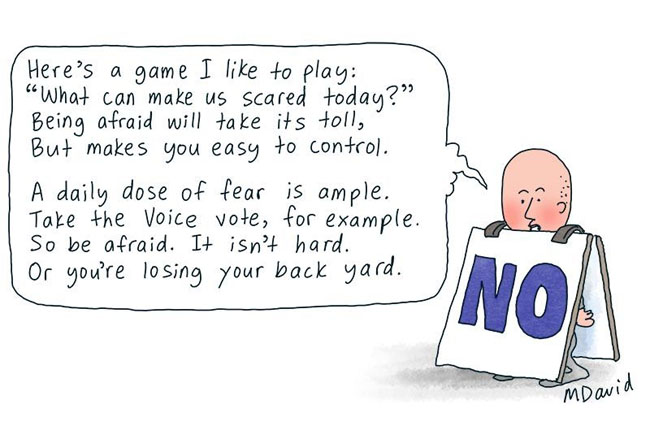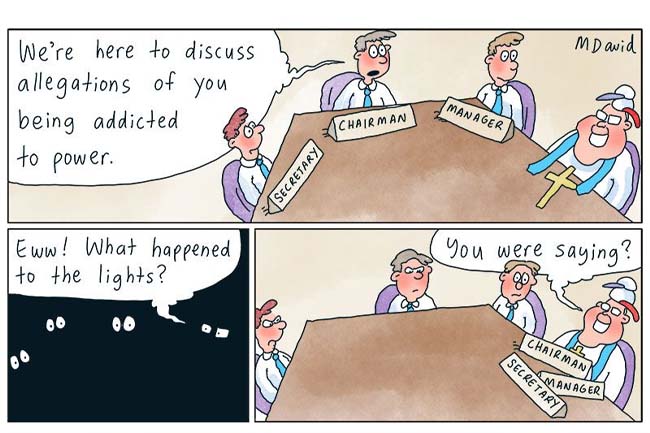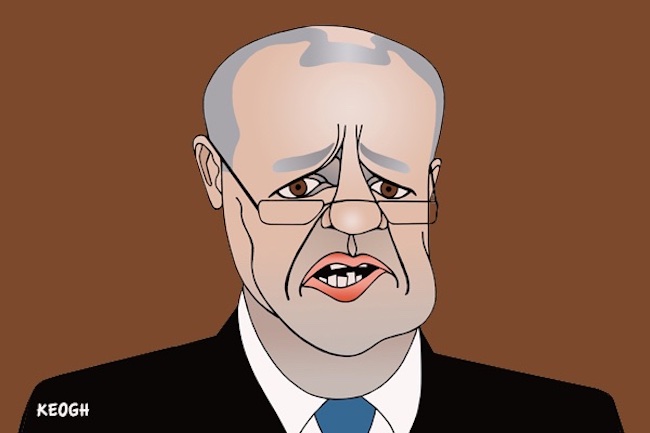Rocky Dabscheck tunes in to hear Australia's greatest living prime minister, John Howard, talk about his hero and the architect of modern Australia, Robert Menzies.
Interviewer
We are incredibly lucky, fortunate and, in fact, humbled to have Australia’s greatest living prime minister, John Howard, in our studio. Welcome Mr Howard.
John Howard
Pleasure to be here.
Interviewer
Mr Howard ...
John Howard
Please call me John.
Interviewer
OK, John. Your book and series ...
John Howard
Sorry. I mean, please address me as Mr John Howard.
Interviewer
OK. You claim Robert Menzies is the father, or architect, of modern Australia.
John Howard
Oh yes, I think the evidence is overwhelming.
(Image via shaunmicallefonline.com.)
Interviewer
Australia is viewed as one of the world’s most successful multicultural nations. Yes?
John Howard
Marvellous country, Australia. I let a truckload of unfortunates with hard to spell last names in from the Balkans, after they’d had the crap belted out of them.
Interviewer
I remember. Prime Minister Menzies presided over the White Australia Policy. How is that multicultural?
John Howard
Well, it is if you take in the larger picture. There were already lots of dark-skinned people in Australia and there are many different shades of white. And he often ate Chinese when he was prime minister.
And don’t forget, he had his photo taken with Africans, Indians and other ethnic types at the meetings of Nations of the British Empire. How multicultural is that! There are photos of him standing in between two dark-skinned men. The man was a visionary!
Interviewer
Would you say our economy is tied to the state of the Chinese economy?
John Howard
Oh, yes, very much so.
Interviewer
Diplomatic relations weren’t established with the People’s Republic of China until December 1972, when Gough Whitlam was prime minister. From 1949 through until then, it wasn’t recognised and Robert Menzies was prime minister for most of that time.
John Howard
I have already stated he ate Chinese a lot. What more do you want from the man?! He absolutely loved dim sims. Couldn’t get enough of them.
Interviewer
They are actually an Australian invention. They don’t eat them in China.
John Howard
Well, they should!
Interviewer
Speaking about the economy. We have been decimal – dollars and cents – since Valentine’s Day, 14 February, 1966.
When did Menzies retire as prime minister?
John Howard
Australia Day, January 26, 1966. Yes, but he went shopping a lot after he retired and was very good with decimal currency. Always got his change spot on.
Interviewer
You have always been very proud of our national anthem, ‘Advance Australia Fair’.
John Howard
One of my favourite melodies. As good as any Bob Dylan tune — and I’m his biggest fan.
Interviewer
When did it become our national anthem?
John Howard
April 1984. I remember the day well.
Interviewer
And Robert Menzies retired in '66. He sang ‘God Save The Queen’, didn’t he? How is that part of modern Australia?
John Howard
Well, he always sang it with a broad Aussie accent.
Interviewer
Again, on money. Superannuation is an important part of our economy, helping to maintain a good lifestyle for people when they have retired from working.
John Howard
Yes, it’s one of the best features of life in Australia.
Interviewer
Wasn’t that introduced by Keating in 1992. Poor Bob Menzies was in the ground by then.
John Howard
Yes. But when Menzies retired, his supporters bought him a very comfortable and elegant house because he had little savings in the bank. Again he was a visionary. That home was a harbinger of the superannuation scheme we have today.
Interviewer
You mention retirement. In your own field of politics, when you look at many of our recent prime ministers – yourself, Kevin Rudd, Julia Gillard, Tony Abbott – you were all voted out, either by the public, or your own party. That is a feature of our contemporary political landscape. The incumbent, Malcolm Turnbull, may also feel the tap on his shoulder soon.
John Howard
Yes, he may. I’m sure Robert Menzies would have been tapped on the shoulder if he had tried for one more term. Mind you, being voted out is rather nasty. Not good for one’s health.
Interviewer
Speaking about health. I believe the major feature of our health system is Medicare, brought in by Whitlam and resurrected by Hawke. And more recently, our NDIS, brought in by Gillard. How is Robert Menzies the architect of our modern health policies?
John Howard
I must admit you’ve got me fucked there. OK. I admit it. Modern Australia was created when Barassi instructed the Carlton players, during the half time break, to handball in the second half of the 1970 Grand Final. But remember who their number one ticket holder was for many, many years? Robert Menzies.
Janette. It’s time to leave.
And you, you young upstart! Who was encouraging trade with Japan even before WWII? And who was one of our biggest trade partners after the war? Japan! I tell you, the man was a visionary.
Interviewer
Sorry. I forgot. Didn’t some of the iron ore come back from the Japanese to Darwin in the shape of bombs?
John Howard
Janette. Robert Menzies was a visionary. You agree with me don’t you, Dear? He was, I tell you. He was, wasn’t he Janette? Janette?
Interviewer
I have more questions. Don’t go. What about the referendum recognising Aboriginal people as citizens and giving them the right to vote. That was in '67 wasn’t it? And what about no-fault divorce?
Janette
I knew you shouldn’t have done this interview, John. The studio reeks of Chardonnay and lattes. I told you he’d be a lefty elitist. Come John, we’re going right now!
Rocky Dabscheck is a musician/songwriter and front person for Rocky and The Two Bob Millionaires. He is also author of Stoney Broke and The Hi-Spenders.
Following the trailer for "Howard on Menzies", here's the trailer for "Humphries on Howard". #thefeedsbs pic.twitter.com/6SkeHSgP1B
— Mark Humphries (@markhumphries) August 21, 2016
Humphries on Howard (source: @markhumphries).

This work is licensed under a Creative Commons Attribution-NonCommercial-NoDerivs 3.0 Australia License
Monthly Donation
Single Donation
It's no laughing matter. Subscribe to IA for just $5.









